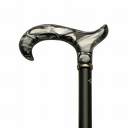
The Writing Group Speaks
by Dick Mashburn
What follows is original but not spontaneous or unprovoked. It’s a
response to one of the interventions of our moderator/chief instigator.
The idea for this game is that she gave us a bunch of scraps of writing
she found on or in the vicinity of her desk. There’s no telling if it
was part of a significant work or just words that somehow came to rest
on that shred of paper.
What’s not in doubt, however, is that being dutiful writing groupers,
we vied for the privilege of putting these would-be gems into a
context, that like a jewelers finest setting can unlock the complete
and true beauty that now lies passively as in a humble …
The President, for Christ sake, is up there in a helicopter, surveying.
“Our worst fears,” he says, “are heading South.”
“It was those bastard Democrats,” he continued (alteration from
original). “They roiled around making such a stink that that jerk
Señior Fox got the Mexican legislature to create a whole package of
benefits for Mexican workers. Now, instead of flooding into this
country to take jobs nobody else wants, and behave like angels because
they know that if they FU, we’ll send ‘em home in a heartbeat, they
shoot down the tubes back to good old Mexico.
“Of course somebody’s got to pay for this, and that bastard Fox got the
legislators to put huge taxes, it’s like Nucular War on all American
companies. By the time Ford adjusts for the new taxes, they have to
jack the price of a “nicely equipped” Focus to $32,000. That puts their
workers in this country out of work and they go scurrying off to North
Carolina to work in the textile mills. Raleigh-Durham is beginning to
look a third world country, and those S.O.B.s over there in Tsunami
Land don’t even appreciate us sending them shirts. Said they need
machines to make shirts, like they used to, not shirts, or worse yet,
us exporting shirts all over the world.
“Thanks a lot World. Thanks for the gratitude.”
Cicadas On Us
by Kalman Kivkovich
2004 was the most recent emerging time of Cincinnati-17-year cicadas. I was here, waiting in anticipation. I remember my father talking to me about those fascinating insects, more than fifty years ago. I recall him claiming to have captured fifty cicadas in some glass jars, just to free them later unharmed. "I can't kill anything," he had said.
Since my early childhood, those goldish-looking bugs had visited at least three times. But in 2004, they came in-force, never seen before. My heavenly-kingdom grounds were not spared. They came a little late, but they came-trillions and trillions of them. And their symphonic non-stop opus, MAN! They say it is exclusively-male stuff. They must know their stuff! The intense, high-pitched humming can harm your eardrums; it can be as loud as a 747 Delta Jet flying over Clifton; it surely fends off birds, sometimes.
I was brave, my wife wouldn't dare to come within a foot and even then I had to hold her hand. I collected a few specimens, housing them in an empty glass pickle jar. Yes, I did pierce the tin cover for breathing air---like my dad, I didn't want to kill them. I waited for them to sing, but they were not in the mood, I guess. All they did was crawl on top of each other. After a few days, there were fewer that still crawled . . . and then came the stench . . . and then came the second empty glass jar---this time it was from mayonnaise, just in case the new cicadas liked it better.
I observed my prisoners closely; my nose was touching the glass. I didn't bother to feed them; they say that cicadas don't eat anything, and that they have already stuffed themselves of tree sap underground. So I just looked at them carefully, I looked at their huge red eyes, one on each side of the head and at the other three little shiny eyes on top of their head. With their wings, they resembled common giant houseflies. The wings were fascinating---glassy and transparent wax-paper-like held by an elaborate vein structure---reflecting sunlight in shimmering rays. My eye traveled to their legs, And legs they have---three pairs of them.
After a two-day clinic, I decided to let my jailbirds go free. Only two were still moving, the rest were stock-still; a few sparkly wings littered the bottom of the jar. I had read that cicadas don't bite; they didn't harm me thus far, although they were everywhere: covering my trees, shrubs, grass, walls and even the windshield of my car. In most cases they simply took off and flew when approached.
I stepped out to the porch. "Okay, little fellows," I said, "your days are numbered anyway. Go find yourself a mate, have fun and die." I took the lid off and shook the jar. No takers. I tapped on the glass. "Go, go you . . ."
And off they went. I wouldn't know if it was a hop or a natural take off. The two creatures flew straight into my thick curly hair. I was startled; I jumped backward, my hands reached up, searching to grab the unforeseen attackers. "Sons of bitches!" I yelled, "Get off me, you bastards!" I ran back into the house and jigged my way to the dinning room.
Locks of hair dropped to the floor. The cicadas kept clinging to my scalp, burying their claws in my now rapidly disappearing hair. The place looked a lot like a barbershop, not a dining room. My screaming and jumping were in vain. By the time I managed to rid myself of those Devils, I was petrified to glance at a mirror; the floor spoke volumes. The two cicadas were still alive, still clenching to some strands of my past glory. In my anger I raised my foot to crush them . . . and then again I remembered my father. "Damn it, I can't!" I scooped the mess into a paper beg and emptied its contents in the woods behind my deck. When I returned, I barely gathered the nerve to peek at my image in the bathroom mirror. "My God, what will Sandi say?" I said to myself. I looked so much different. Heartbroken, I left the bathroom. I took off my sandals and headed to the bedroom. My right foot hit the doorjamb. "Fuck! Oh God . . ." In an instant, all my grief of loosing my hair had vanished---I was dancing, kicking my legs up and high. . . .
It has been a couple of years since my encounter with those terrestrial flying vermin. I still have some hair left, but not much to brag about. The important thing is that my wife likes it as it is, so she says. And one more thing: I have been told by many that my Jive has improved. . . .
CICADAS AND OTHER FANTASIES KEPT IN GLASS JARS
by Sandi Kivkovich
My father claims to have captured fifty cicadas in glass jars.
He also claims to have freed them.
"I can't kill anything," he said.
My father claims he can tell when it is going to rain.
His sisters tell how as a child he pretended to be the wind and the storm cloud.
"I can't hide my feelings," he said.
My father claims he can tell a story about anything.
He captivated my youth and beyond.
"Life is a story," he said.
My father claims that he understands feelings.
All are important.
"A child's problems seem as large to them as those of adults," he said.
My father claims he is fine.
He slaps his knee and laughs and sings songs in gibberish to me.
"What's your name little girl?" he said.




































